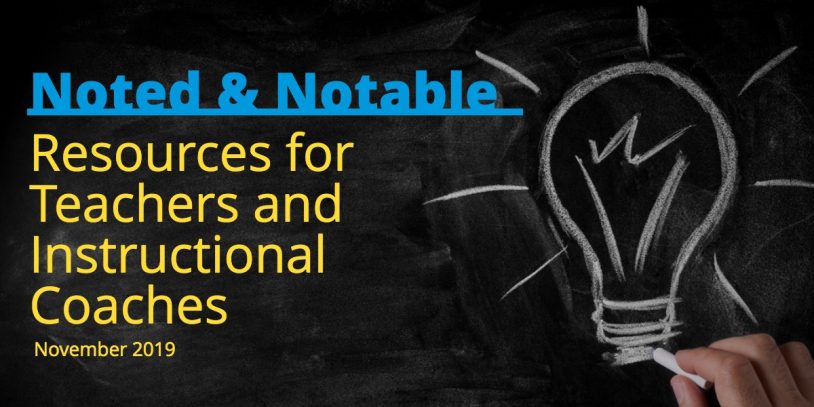Resources for Teachers & Instructional Coaches – November 2019

Gobble up these recommended reads for teachers and instructional coaches during this holiday break. Here are a few articles for educators about professional development.
Stuffed full of knowledge? Don’t consume more, consume better
Your Curiosity Quotient is your ability and motivation to learn and make sense of the world around you in a new and innovative way. Six ways to increase your ability for continuous learning include becoming an early adopter, deepening your understanding, tacking challenging assignments, not letting stress get in your way, challenging your perspective, and broadening your comfort zone.
Don’t be afraid to try something new — really new. Not every new technology will be a success or become a market sensation, and not every new management technique will resonate with you or your team. Early adopters constantly learn to adapt.
Each new gadget and every new leadership method challenges you to think a bit differently, gain new insights, and to examine knowledge you already have, but in a new light. Being curious about the new increases our understanding of the status quo.
Read more on SmartBrief: How to raise your curiosity quotient
The key to effective coaching is to embed it in the culture of a school or district
Administrators can foster a strong culture by creating a sense of purpose and a set of norms, rituals, and traditions at the school. Once this culture has been created, coaching can fuel growth mindsets and a willingness to take risks.
Even principals appreciate coaching, research indicates, with a recent study suggesting 70% of principals believe coaching is at least somewhat valuable, but only 66% have actually participated in a coaching program. Instructional coach Jim Knight believes the approach is valuable because the format of working one-on-one in a safe environment allows for better information retention than traditional “sit-and-get” PD.
Check out all the ideas on Education Dive: Building strong culture around coaching improves PD’s effectiveness
Effective PLCs will anchor work to an established framework
Professional learning communities can cultivate inquiry and reflection among teachers. But having a shared language to describe where you’re headed as a community is an important consideration.
One options is the Universal Design for Learning (UDL) framework. It focuses on the continual process of attaining knowledge. The authors, one a district admin and one a consultant, explore how UDL helps support their PLC model:
The UDL PLC structure promotes a continued professional learning opportunity for teachers to plan standards-based units of instruction, incorporate student engagement and choice, discuss applied practices, review student work/data, and offer each other feedback using a common framework that is endorsed in federal legislation, the Every Student Succeeds Act (ESSA, 2015).
Read more on eSchoolNews: A Perfect Pairing: UDL and PLC’s

